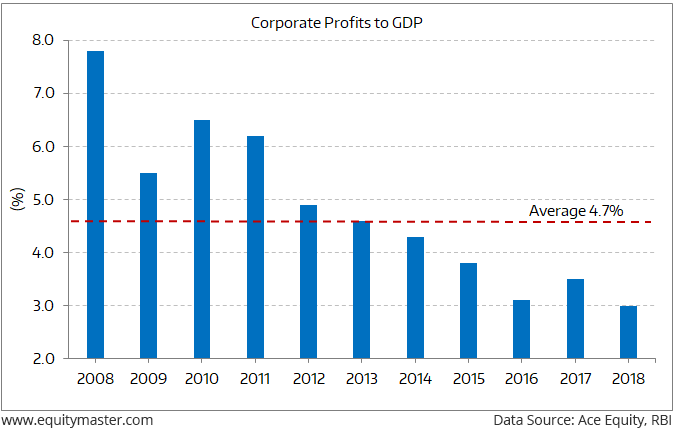India's Third Giant Leap
This Could be One of the Biggest Opportunities for Investors
- Home
- Todays Market
- Indian Stock Market News January 21, 2020
Sensex Opens Lower; Consumer Durables and Auto Stocks Lose Tue, 21 Jan 09:30 am
Asian stock markets are lower today as Chinese and Hong Kong shares fall. The Shanghai Composite is off 1.1% while the Hang Seng is down 1.8%. The Nikkei 225 is trading down by 0.8%.
Back home, India share markets opened on a negative note. The BSE Sensex is trading down by 127 points while the NSE Nifty is trading down by 29 points. Both, the BSE Mid Cap index and BSE Small Cap index opened down by 0.2%.
Barring oil & gas stocks, all sectoral indices have opened the day in red with consumer durables stocks and automobiles stocks witnessing maximum selling pressure.
Speaking of stock markets, co-head of research, Rahul Shah in his latest video outlines the action you can take if the bull market of 2019 by passed you.
Tune in now...
The rupee is currently trading at 71.18 against the US$.
The rupee slipped 3 paise to close at 71.11 against the US dollar on Monday, tracking a steady rise in crude oil prices and weakness in domestic equities.
Reportedly, the drop in the rupee was largely due to a spurt in crude oil prices following rising tensions in the Middle East and North Africa.
At the interbank foreign exchange market, the local currency opened on a weak note at 71.07 and fell further to a low of 71.15. It finally settled at 71.11, lower by 3 paise against its previous close.
The domestic unit had settled at 71.08 against the American currency on Friday.
Speaking of currencies, Vijay Bhambwani, editor of Weekly Cash Alerts, tells you the main reasons why not to trade commodities and currencies the same way you would trade equities. Here's an excerpt of what he wrote...
- Currencies are traded in pairs and the most liquid is the USDINR. Currencies are traded in four decimal points just as bonds are. The international derivative trader's association has indicated that forex may be traded in 6 decimals in the coming few years.
It takes months sometimes for the currency pair to pass the next round figure, say from 70 to 71.
Can you really trade commodities and currencies alike or for that matter, equities and currencies alike? Definitely not!
To know more, you can read Vijay's entire article here: Is Trading in Equities, Commodities, and Currencies the Same?
Moving on to the news from the economy. The International Monetary Fund (IMF) lowered India's economic growth forecast to 4.8% for this fiscal year owing to the crisis in the non-banking financial sector and weak rural demand.
It also cut the world's growth estimate and blamed the slowdown in India for its move.
The IMF projection, 1.3 percentage points lower than its earlier estimates, is less than the 5% projected by the official advance estimates.
The IMF projected India's economy to grow by 5.8% next year, which is 1.2 percentage points less than its earlier forecast. It also forecast the economy to grow by 6.5% in 2021-22 which is 0.9 percentage point lower than earlier projections.
The IMF estimated world economic growth at 1.9% for 2019, 0.1 percentage point lower than its earlier forecast.
Similarly, it projected the global economy to grow by 3.3% in the current calendar year, 0.1 percentage point lower than its previous estimates, and 3.4% in 2022, 0.2 percentage points below its earlier estimates.
The downward revision primarily reflects negative surprises to economic activity in a few emerging market economies, notably India, which led to a reassessment of growth prospects over the next two years.
Volatile markets and some recent economic numbers have confused investors.
Note that, economic growth (GDP) and corporate profit growth hardly go hand in hand.
Over the past few years, the share of corporate profits to GDP has steadily declined.
Rebound in Corporate Profits May Not Immediately Reflect in GDP
The revival of capex cycle may cause corporate profits to soar much faster than the GDP growth.
Investors who stay focused on macro numbers may miss this bus.
To know what's moving the Indian stock markets today, check out the most recent share market updates here.
For information on how to pick stocks that have the potential to deliver big returns, download our special report now!
Read the latest Market Commentary



Equitymaster requests your view! Post a comment on "Sensex Opens Lower; Consumer Durables and Auto Stocks Lose". Click here!
Comments are moderated by Equitymaster, in accordance with the Terms of Use, and may not appear
on this article until they have been reviewed and deemed appropriate for posting.
In the meantime, you may want to share this article with your friends!